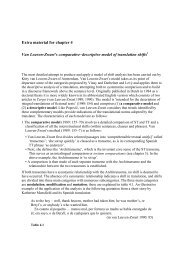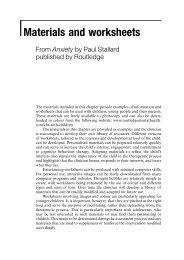Politics and International Relations 2011 (UK) - Routledge
Politics and International Relations 2011 (UK) - Routledge
Politics and International Relations 2011 (UK) - Routledge
Create successful ePaper yourself
Turn your PDF publications into a flip-book with our unique Google optimized e-Paper software.
50<br />
iNterNAtioNAl security<br />
ForthcomiNg<br />
Conflict, Security <strong>and</strong><br />
development<br />
An Introduction<br />
Paul Jackson <strong>and</strong> danielle Beswick, both at<br />
University of Birmingham, <strong>UK</strong><br />
This new textbook addresses<br />
the the impact of conflict <strong>and</strong><br />
security on development<br />
initiatives. The authors marry<br />
academic teaching <strong>and</strong><br />
approaches with practical policy<br />
through three key features:<br />
• using the best of recent<br />
academic theory, field research<br />
<strong>and</strong> policy to provide an<br />
overview of the connections<br />
between security <strong>and</strong><br />
development<br />
• exploring the implications of these connections for the<br />
theory <strong>and</strong> practice of development<br />
• investigating the challenges that arise for post-conflict<br />
reconstruction when we recognise that security <strong>and</strong><br />
development are mutually contingent.<br />
The authors are experienced in both the theory <strong>and</strong><br />
practice of development <strong>and</strong> conflict, <strong>and</strong> illustrate the<br />
theory about the links between conflict, security <strong>and</strong><br />
development with practical examples, drawing on<br />
up-to-date literature <strong>and</strong> personal experience. Each<br />
chapter is informed by student pedagogy.<br />
Selected Contents: 1. Introduction 2. Security <strong>and</strong><br />
Development - Mutually Reinforcing? 3. Accounting for<br />
Conflict in the Developing World 4. The Changing Nature of<br />
Conflict <strong>and</strong> its Impact on Development 5. Development<br />
Actors in War 6. <strong>International</strong> <strong>and</strong> Humanitarian Intervention<br />
7. The Privatisation of Security 8. Development <strong>and</strong> Security<br />
in Post-Conflict Environments 9 . <strong>International</strong> Responses to<br />
the Development-Security Dilemma 10. Conclusions:<br />
Development <strong>and</strong> Security - Reconnecting the Threads.<br />
Select Bibliography<br />
June <strong>2011</strong>: 246 x 174: 224pp<br />
Hb: 978-0-415-49984-2: £90.00<br />
Pb: 978-0-415-49983-5: £23.99<br />
For more information, visit:<br />
www.routledge.com/9780415499835<br />
The <strong>International</strong> Humanitarian<br />
Order<br />
Michael Barnett, George Washington University,<br />
USA<br />
Series: Security <strong>and</strong> Governance<br />
This book provides a critical<br />
exploration of the politics <strong>and</strong><br />
practice of global ethical<br />
interventions. Organized in four<br />
parts Michael Barnett examines<br />
the tensions in the relationship<br />
between global governance,<br />
ethics, <strong>and</strong> international order.<br />
Selected Contents:<br />
Section 1: UN <strong>and</strong> World Order<br />
Section 2: The Ethics of<br />
Intervention<br />
2009: 234 x 156: 240pp<br />
Hb: 978-0-415-77631-8: £85.00<br />
Pb: 978-0-415-77632-5: £24.99<br />
eBook: 978-0-203-86297-1<br />
For more information, visit:<br />
www.routledge.com/9780415776325<br />
ForthcomiNg<br />
Contemporary European<br />
Security<br />
david J. Galbreath, University of Aberdeen, <strong>UK</strong><br />
European security is a complex network of insecurities,<br />
institutions <strong>and</strong> initiatives. Europe is faced with the<br />
traditional insecurities of inter- <strong>and</strong> intra-state conflict as<br />
well as non-state threats to security such as<br />
environmental, health <strong>and</strong> human security. The region’s<br />
attempts to combat these insecurities have been to<br />
develop <strong>and</strong> foster regional institutions, such as the EU,<br />
NATO, OSCE <strong>and</strong> even the Council of Europe. In turn,<br />
member-states <strong>and</strong> the institutions have set out various<br />
ways to combat a range of insecurities from ethnic<br />
conflict to human trafficking.<br />
This text explores the complex European security<br />
architecture with an eye on introducing students to the<br />
empirical, theoretical <strong>and</strong> conceptual approaches to<br />
European security.<br />
Selected Contents: Part 1: Framing European Security<br />
1. A Changing Security Architecture 2. From Cold War to<br />
European Peace 3. Uncovering European Security Today<br />
Part 2: Institutions of European Security 4. North<br />
Atlantic Treaty Organization 5. Organization for Security <strong>and</strong><br />
Cooperation in Europe 6. European Union 7. Council of<br />
Europe Part 3: Issues of European Security 8. National<br />
Security 9. Societal Security 10. Human Security<br />
11. Non-state actors <strong>and</strong> security 12. European Security:<br />
Where Do We Go From Here?<br />
October <strong>2011</strong>: 246 x 174: 224pp<br />
Hb: 978-0-415-47356-9: £80.00<br />
Pb: 978-0-415-47357-6: £23.99<br />
For more information, visit:<br />
www.routledge.com/9780415473576<br />
ForthcomiNg<br />
democracy <strong>and</strong> Intervention<br />
John Macmillan, Brunel University, <strong>UK</strong><br />
Series: Critical Issues in Global <strong>Politics</strong><br />
This book develops a systematic underst<strong>and</strong>ing of the<br />
conceptual, ethical, political <strong>and</strong> theoretical dimensions<br />
of intervention in an empirical/historical context. The<br />
book will focus primarily on the theory <strong>and</strong> practice of<br />
intervention as pertaining to the nexus between<br />
democracy/democracies <strong>and</strong> international society.<br />
Selected Contents: 1. Introduction A. Concepts <strong>and</strong><br />
debates 2. The Conceptual Bases of Intervention &<br />
Non-Intervention in <strong>International</strong> Society 3. The Ethics of<br />
Intervention 4. Intervention as Governance B. Continuity<br />
<strong>and</strong> Change in the History of democratic State<br />
Intervention 5. Intervention between the Powers:<br />
Revolution <strong>and</strong> Post-War Reconstruction 6. The Imperial<br />
Age: Competition, Capital <strong>and</strong> Conscience in the Expansion<br />
of the European system 7. The Cold War: The Defence of<br />
Interests in the Age of Nationalism <strong>and</strong> Ideological Contest<br />
8. The 1990s: The Humanitarianism Moment 9. The 2000s:<br />
Terror <strong>and</strong> Regime Change C. Intervention <strong>and</strong><br />
Governance in the Global Political System<br />
10. Humanitarianism <strong>and</strong> Human Rights: The Use of Force<br />
Reviewed 11. Terror: The Use of Force Reviewed<br />
12. Conclusions<br />
August <strong>2011</strong>: 216 x 138: 192pp<br />
Hb: 978-0-415-44494-1: £80.00<br />
Pb: 978-0-415-44495-8: £20.99<br />
For more information, visit:<br />
www.routledge.com/9780415444958<br />
New<br />
Humanitarianism Contested<br />
Where Angels Fear to Tread<br />
Michael Barnett, George Washington University,<br />
USA <strong>and</strong> Thomas G. Weiss, City University of New<br />
York, USA<br />
This book provides a succinct<br />
but sophisticated underst<strong>and</strong>ing<br />
of humanitarianism <strong>and</strong> insight<br />
into the on-going dilemmas <strong>and</strong><br />
tensions that have accompanied<br />
it since its origins in the early<br />
nineteenth century. Combining<br />
theoretical <strong>and</strong> historical<br />
exposition with a broad range<br />
of contemporary case studies,<br />
the book:<br />
• provides a brief survey of the<br />
history of humanitarianism,<br />
beginning with the anti-slavery movement in the early<br />
nineteenth century <strong>and</strong> continuing to today’s challenge<br />
of post-conflict reconstruction <strong>and</strong> saving failed states<br />
• explains the evolution of humanitarianism<br />
• presents an overview of the contemporary<br />
humanitarian sector, including briefly who the key<br />
actors are, how they are funded <strong>and</strong> what they do<br />
with their money<br />
• analyses the ethical dilemmas confronted by<br />
humanitarian organization<br />
• examines how humanitarianism poses fundamental<br />
ethical questions regarding the kind of world we want<br />
to live in, what kind of world is possible, <strong>and</strong> how we<br />
might get there.<br />
An accessible <strong>and</strong> engaging work by two of the leading<br />
scholars in the field, Humanitarianism Contested is<br />
essential reading for all those concerned with the future<br />
of human rights <strong>and</strong> international relations.<br />
Selected Contents: Introduction 1. Humanitarianism: The<br />
Essentials 2. ’Birth’ <strong>and</strong> Maturation, 1864-1945 3. The<br />
Traditional Enterprise, 1945 - 1989 4. The Turbulent<br />
Post-Cold War Era: The New Humanitarianism? 5. Turbulent<br />
Humanitarianism Since 1989: Rhetoric Meets Reality<br />
6. Humanitarianism’s Past <strong>and</strong> Possible Futures: Ten Guiding<br />
Questions<br />
February <strong>2011</strong>: 216 x 138: 160pp<br />
Hb: 978-0-415-49663-6: £75.00<br />
Pb: 978-0-415-49664-3: £17.99<br />
eBook: 978-0-203-82930-1<br />
For more information, visit:<br />
www.routledge.com/9780415496643<br />
complimentary exam copy e-inspection New in Paperback companion Website
















